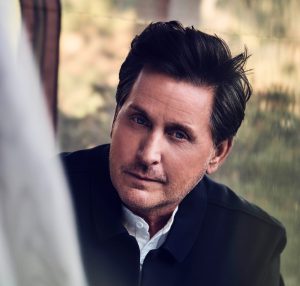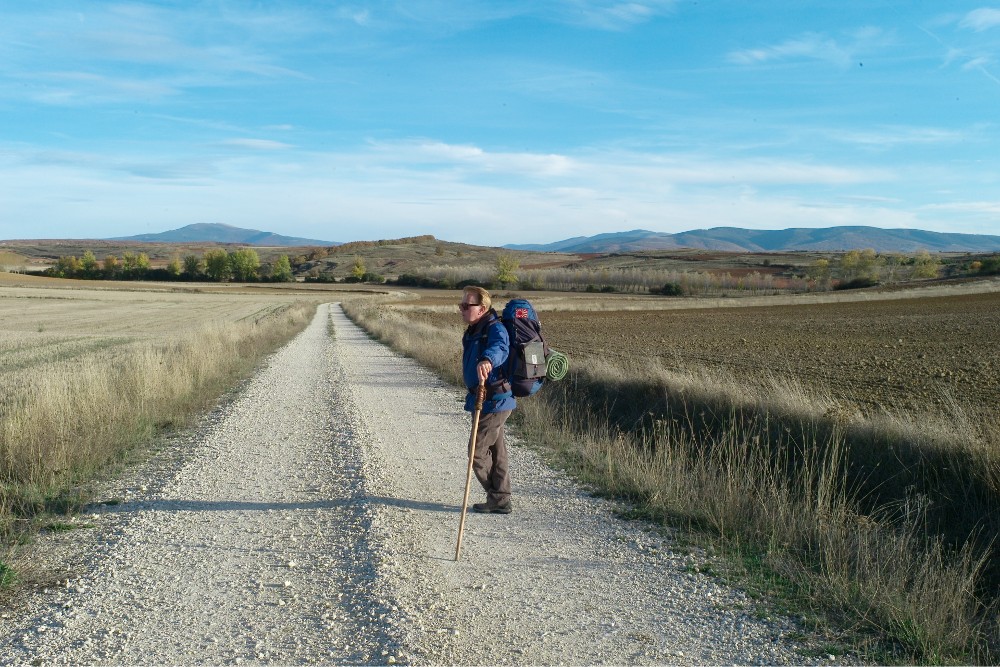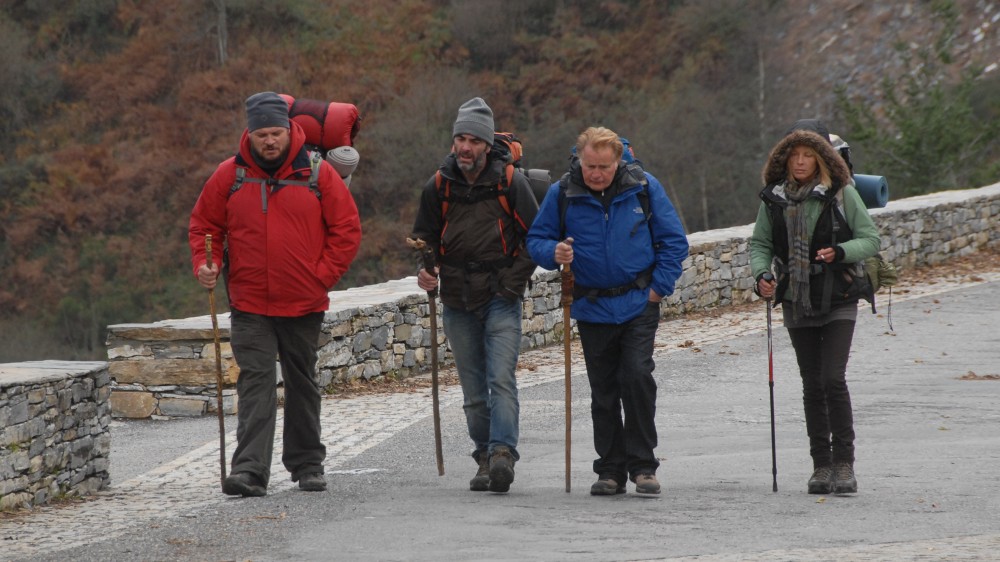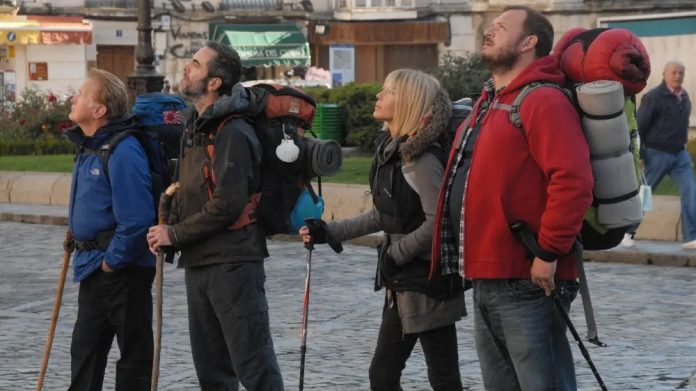If there’s one thing to know about working in Hollywood, it’s that once you make a movie… or a television show… or an album… that piece of art or whatever you want to call it is out there, and it’s out there forever. If you bring a movie, say, to Sundance, and it doesn’t sell right away, or a movie you’ve made gets released in theaters and just tanks at the box office, that doesn’t mean it’s gone forever.
That’s the lesson to be learned from Emilio Estevez‘s journey with The Way, which received a modest theatrical release in October 2011, when it managed to scrape together $4.4 million over the course of five months. Nearly 12 years later, Fathom Events is bringing The Way back to theaters for a single day on Tuesday, May 16, as the film continues a journey as long as the one that its characters go on in the film.
The Way stars Estevez’s real-life father, Martin Sheen, as Tom, a man who travels to Spain to retrieve the ashes of his son (played by Estevez), who died while attempting to travel El Camino de Santiago (i.e. “The Way of St. James”), a path across Europe akin to the Appalachian Trail, but one with more spiritual connotations. The travelers who walk across the various paths that make up the Camino are even known as “pilgrims,” as they’re making a pilgrimage. Once in Spain, Tom decides to journey across the Camino with his son’s ashes, and he meets a few other international travelers (Deborah Kara Unger, James Nesbitt) along the way.
Estevez’s portrayal of the Camino in The Way had quite an impact, to the point where it’s regularly cited in travel guides about the region. In fact, the re-release of The Way is bookended by an intro and discussion with travel expert Rick Steves that is sure to draw even more “pilgrims” to the Camino — and hopefully draws a few to theaters, as well.
Above the Line recently spoke on the phone with Estevez about his own journey in making another movie with his father, and what it means to him for his film to be granted a second life in theaters, even if it’s for one night only.

Above the Line: I saw The Way when it first made the rounds in 2011, and I connected with it more now, 13 years later, perhaps because I’ve had parents die and I’ve survived cancer myself, so maybe I’m more open to the spiritual side of things than I was back then.
Emilio Estevez: Of course. It is a movie that kind of grows on you as you grow and age. Obviously, coming out of the pandemic, it’s just more relevant, and more resonant now, I think, with people. We’re all looking at hitting the “reset” button and trying to figure out our place in the world and grieving the people we lost, and all these things we’re having to sort of face. I think you’re able to tuck into the film and feel like we’re not alone.
ATL: Did you seek out Fathom Events to re-release it, or did someone approach you?
Estevez: The Fathom Events of it all happened almost by accident. I was approached by Chris Bueno at Ocean Avenue Entertainment almost two years ago, and he said, ‘Your movie is in movie jail. I think I can help you get it out.’ We began a dialogue in an effort to free the movie from what was motioned to abandoned rights court, and then, the term limit that I had with the companies that had the movie, the original distributors, those term limits were over. It was a combination of timing and luck, to a certain extent, and then rescuing the movie.
Our thought was to just put it back out on streaming, and we’d have it out there again, and we would get what we could get. [Then] Fathom entered the picture, and said, ‘We want to put it back on screen.’ I thought, ‘Oh my gosh, okay, let’s do that. What will that require?’ It’s a big effort anytime you’re going to get a movie on [the big] screen, even if it’s for one night. If you’re looking at 1000 screens, you’ve got to support that film so that people go out and see it. That’s what we’re doing, and that’s why we’re on the phone now.
ATL: It feels like a very personal film, and I’m not sure if that’s because you have your father starring in it, but did you know much about El Camino before this film?
Estevez: No, my son lived in Spain for nine years. He was out in the Camino. He went there with my father in 2003, because he was working as his assistant on The West Wing. He met a gal in a town called Burgos, which is where the kid steals the backpack. My son was living there, and I was going to visit him and his now wife, then girlfriend. Her family ran a casa rural [translation: “country house”] — an albergue [i.e. hostel] where they took in the pilgrims.
In my travels to visit my son, I would see these pilgrims and see people from all over the world coming through their establishment. I was like, ‘Wow, okay, this is interesting.’ And then my Dad said, ‘Well, let’s make a movie on the Camino.’ We began a dialogue [about] what that would be and developed it, and we had a screenplay by the winter [of] 2009. And then, by that fall, we were shooting, so it came together very quickly.
Estevez: I’m glad to hear your father was involved early on. I was wondering whether you had to deal with his agent and all that jazz.
Estevez: [laughs] No, he was very involved and very encouraging as we were putting it together, but he also had some ideas about the script that he wanted to see implemented into the draft. Things like the bag falling into the river, that was his idea, and the Roma kid grabbing the backpack, that was his idea, [too]. He wanted to do all these action-packed things. When we shot the film, I think he was almost 70, so I thought, “Okay, if he wants to do it, I’ll put it in the script [and we’ll] see if we can pull it off.” So, he was very involved and very invested in it.
ATL: I was curious about the action stuff. I met your father maybe a couple of years after The Way when he was doing the Amazing Spider-Man junket, and he was just the life of that junket. Everyone loved him, he was just amazing.
Estevez: That’s the thing about my old man. In playing this character, he was this sort of guy — he wants to be everybody’s friend, as you know, having done the junket with him. He’s running for mayor all the time. He’s never met a stranger. He’s always jovial, telling stories and jokes. That is not who Tom is, so there was conflict on the set. It was me telling my old man, ‘Hey, you’re not a nice guy. You’re a curmudgeon. Tom is a curmudgeon. You don’t speak Spanish. You’re not this guy. You will be transformed by the end of the film, but for two-thirds of the film, you’re prickly. You’re not a nice dude.’ He finally got that, but he didn’t like playing an unlikable character.
ATL: You’ve directed a few movies, so when you’re writing something like this, are you considering things like budget, or how and where you’re going to shoot it? Did you actually go to the different locations on the Camino?
Estevez: We traveled the entire Camino. We started in St. Jean. We hiked up over the Pyrenees and down into Roncesvalles at night. He was a champion the whole route. He wanted to have a full backpack, which was probably a good 20 pounds heavier than what the actual pilgrims carry, but he insisted on having a heavy backpack. He was an absolute trooper, going all the way from the Pyrenees, all the way to Misia.
We probably walked somewhere between 200 to 250 miles of the actual Camino. Mind you, we had 50 people with us. We had a pretty large crew, so it wasn’t like we were just shooting it on our iPhones. We shot it on Super 16, so the film has a real grainy look. It just feels grounded, and it feels as real as the people in the film.

ATL: Were you and DP Juanmi Azpiroz able to develop the film and see the rushes along the way, or did you just have to shoot everything and see what you had later?
Estevez: No, we were running the film from the Camino down to Madrid every night. In fact, the lab in Madrid said, ‘Emilio must be insane. We’ve never processed this much film ever on any movie.’ I think we shot over a million feet.
ATL: What about assembling the cast around your father? Deborah Kara Unger is someone fairly well-known, but I wasn’t as familiar with the other two actors, so how did you cast them?
Estevez: It was through phone conversations. I had a Los Angeles casting director. We were already in Spain, and we were prepping, and it wasn’t until the last couple of weeks before shooting started that we cast Jimmy Nesbitt and Yorick [van Wageningen]. The character of Jack was originally supposed to be a British subject. When they showed me a couple of films that Jimmy had done, I was just knocked out by his work, and thought, ‘Okay, I’ll make the character Irish and he doesn’t have to affect a British accent.’
I wanted the characters to all play to their actual nationalities, so Deborah is Canadian, Yorick is Dutch, and Jimmy is indeed Irish. Northern Ireland is where he’s from. And then, of course, the American, Tom. I just thought [that] to play to our nationalities was very much in line with the actual Camino itself, where you meet people from all over the world.
ATL: When you were in Spain visiting your son, did you meet a lot of the pilgrims along the path as well?
Estevez: Because of his then-girlfriend, now wife, [and] the albergue that her parents ran, I would be staying out at this casa rural and meeting pilgrims as they came through.
ATL: I have to admit that I laughed when Deborah punched your father because I wasn’t expecting it, plus, it seemed like a pretty solid punch.
Estevez: He insisted that she hit him, and she did. I thought she knocked his teeth out, but it’s kind of a gnarly scene, especially when you learn later why she reacts the way she does. She just doesn’t trust men, understandably, because of her past. What I also wanted to do during the course of the film is to have these three men in her life along the Camino, [who] are more like brothers [who] protect her, so that by the end of the pilgrimage, she is on her way, in terms of her healing, to be able to trust men again. That was really important.
ATL: I want to ask about the music, because I liked the score a lot, but also the song choices. Was it hard to get some of those songs, like Alanis Morissette and Coldplay, or was it just the usual negotiating?
Estevez: It was basically me going to the agents, hat in hand, and saying, ‘In a perfect world, we have no money to pay you, basically just a small fee…’ But yeah, to be able to get James Taylor and Alanis Morissette and Coldplay and Nick Drake… it’s a lovely soundtrack, and Tyler Bates, who — he did Guardians of the Galaxy and 300, [so] he’s a million-dollar composer. I had worked with Tyler for years, so when I said, ‘I’ve got this independent movie, and I can’t pay you anything,’ he was like, ‘I’m in. I love this film. Let’s go.’
When you make something that is clearly from your heart, and you appeal to your fellow artists, and you say, ‘Hey, I don’t have a lot of dough to pay you, however, I need you and I’m inspired by your work. Can you join us?’ More often than not, people do. Artists, they understand the struggle. They understand how difficult it is to get anything made, let alone [an] independent film these days.

ATL: Rewatching this, I had to remind myself that this was made 13 years ago because this is the kind of movie that probably could have been made during the pandemic, seeing as how it takes place mainly outdoors with a small cast.
Estevez: You’re right, it is. It could have actually been made… it was a perfect pandemic movie. The film really does feel timeless. There’s a little bit of technology in it, but for the most part, it does pay tribute to the ancient pilgrimage, in that there’s not a lot of built-in technology in the picture.
ATL: Since making The Way, you made another movie, The Public, so have you been developing anything to direct next? Are you always looking to direct first and foremost, or do you have things brewing on the acting side?
Estevez: Oh, yeah, of course. We’re working on several things. One is the follow-up to The Way. I’ve been working on a sequel to The Way, and I finally cracked the code this year to try to figure out [how] to continue Tom’s story. I’m nearing the completion of the draft on that, and my Dad’s gonna be 83 this year. This is a picture that I hope to get up and running sooner than later, and get over to Spain and start doing some of the R&D and scouting.
ATL: That would be great. It’s hard enough to get a movie made…
Estevez: [chuckles] I know, man.
ATL: I didn’t know about the rights issues you got into with this film, but I’m glad you were able to get past that.
Estevez: It was just a nightmare, but as you know, it’s hard enough making any movie these days. The fact that any picture gets made is an absolute miracle. It’s the sort of thing where I’m just grateful that people are going to have another look at this on the big screen, rather than in their homes. Of course, the movie will be available on streaming and back on DVD with the extras.
I don’t know if you know, but we brought in Rick Steves, the travel icon. Rick, he’s helping us open the movie now, and there’s a 20-minute dialogue at the end with Rick and Martin, and me, where I play moderator and I walk them through various questions about travel and faith, and why travel is important, and Spanish culture, and the making of the movie. It’s a lively conversation and a really nice and important addendum to the film that I think helps make it feel more current [and] more relevant.
ATL: Before I let you go, I should tell you that you’ve been talking to one of the biggest Repo Man fans on the planet. I saw it in theaters when I was about 19, and I try to see it every five years or so…
Estevez: Oh, my gosh. I guess my question to you is, ‘Does the movie make any sense to you?’
ATL: Over the course of time, it has. They did a retrospective series for Harry Dean Stanton a few years ago, maybe right before he passed, and I got to see it again on the big screen. I also recently saw Paris, Texas, for the first time, and I was shocked he didn’t get an Oscar nomination.
Estevez: [sighs] Yeah, being in that game costs a lot of money, and if you want to get a nomination, you gotta be willing to play polo, and you gotta have six ponies, and you gotta have a studio behind it. Yes, he should have been nominated for that. He was absolutely brilliant in Paris, Texas, [but] again, you gotta pay to play, to a certain extent.
ATL: And your father in The Way, too. That was another fine performance that was overlooked.
Estevez: I agree, I agree. 100 percent.
ATL: Maybe if a sequel ever happens, he’ll get some of the recognition he deserves.
Estevez: Indeed. Thank you. I appreciate it. Thanks so much for your time.
The Way will play in theaters across the country for one night only on Tuesday, May 16, via Fathom Events.



